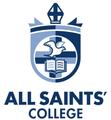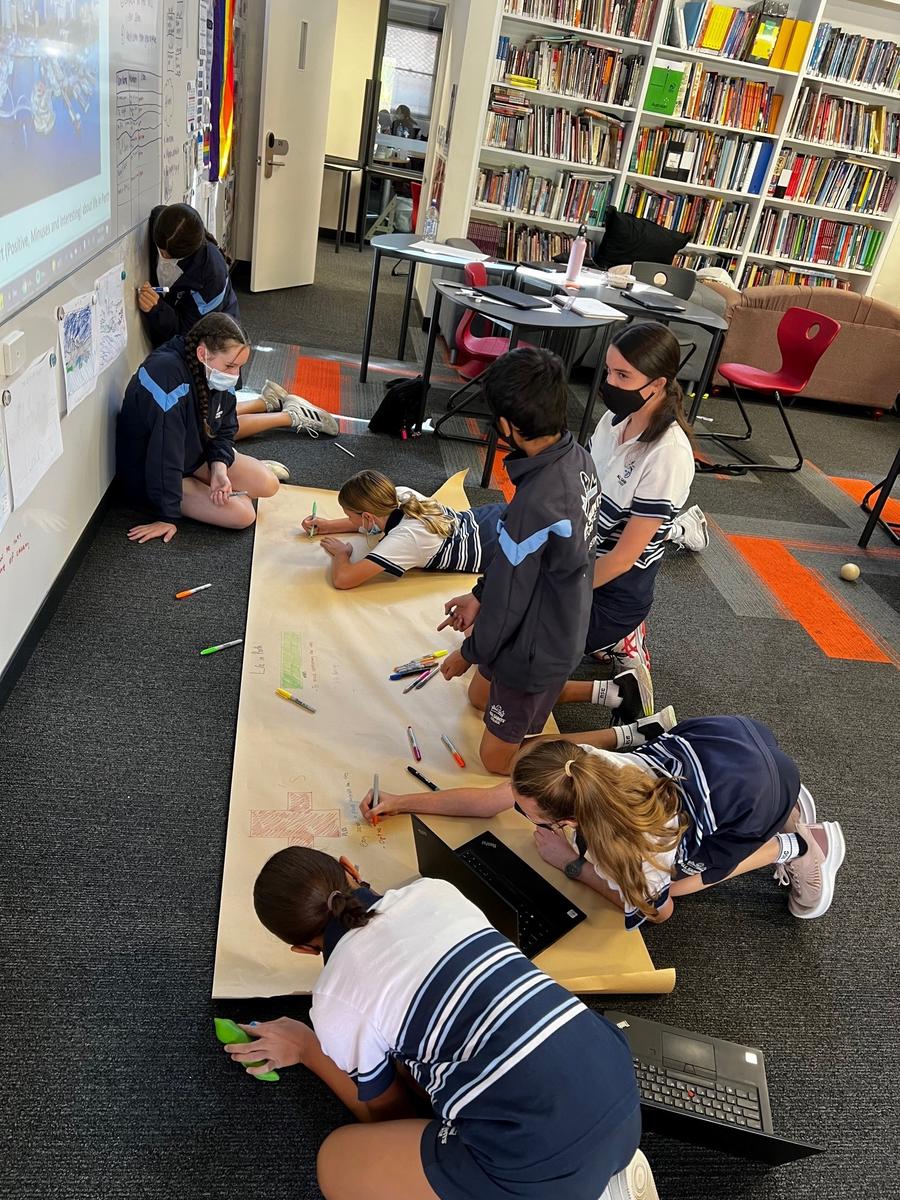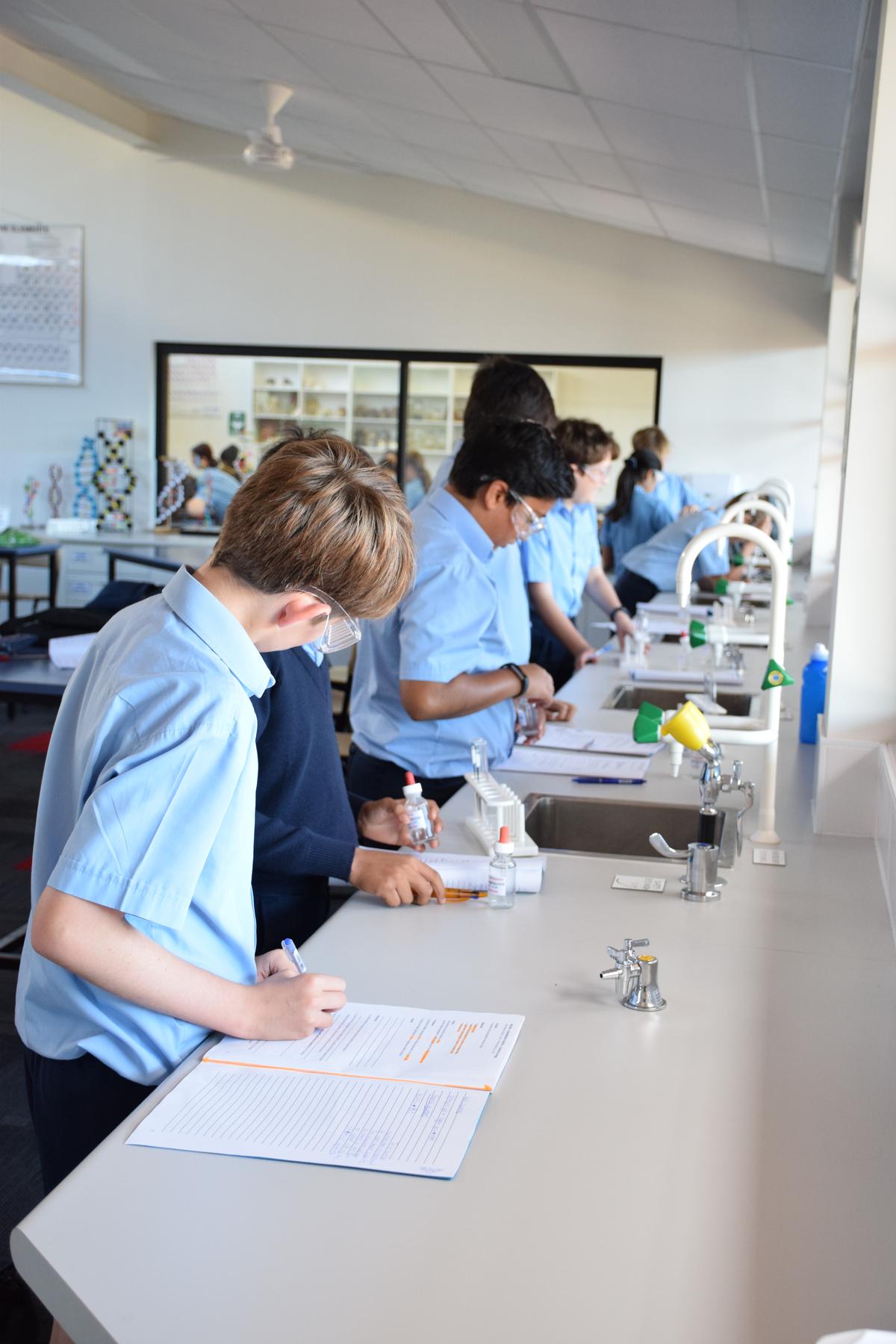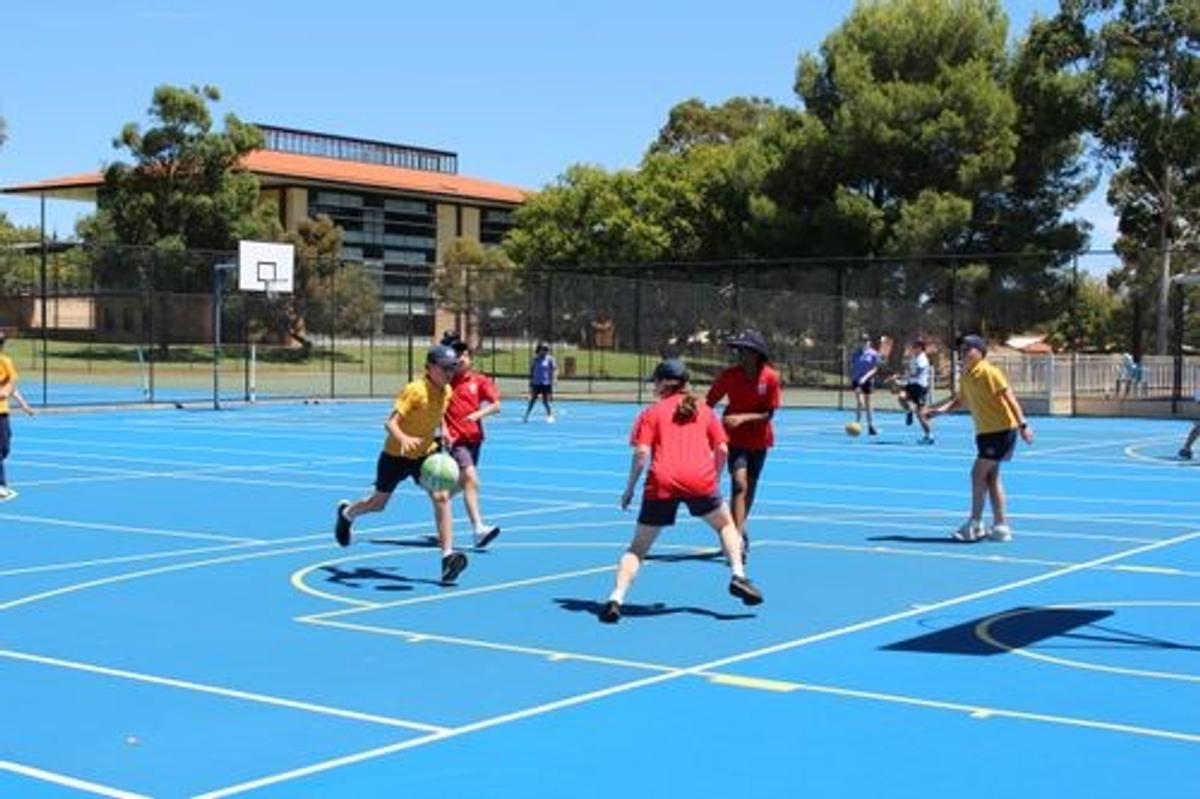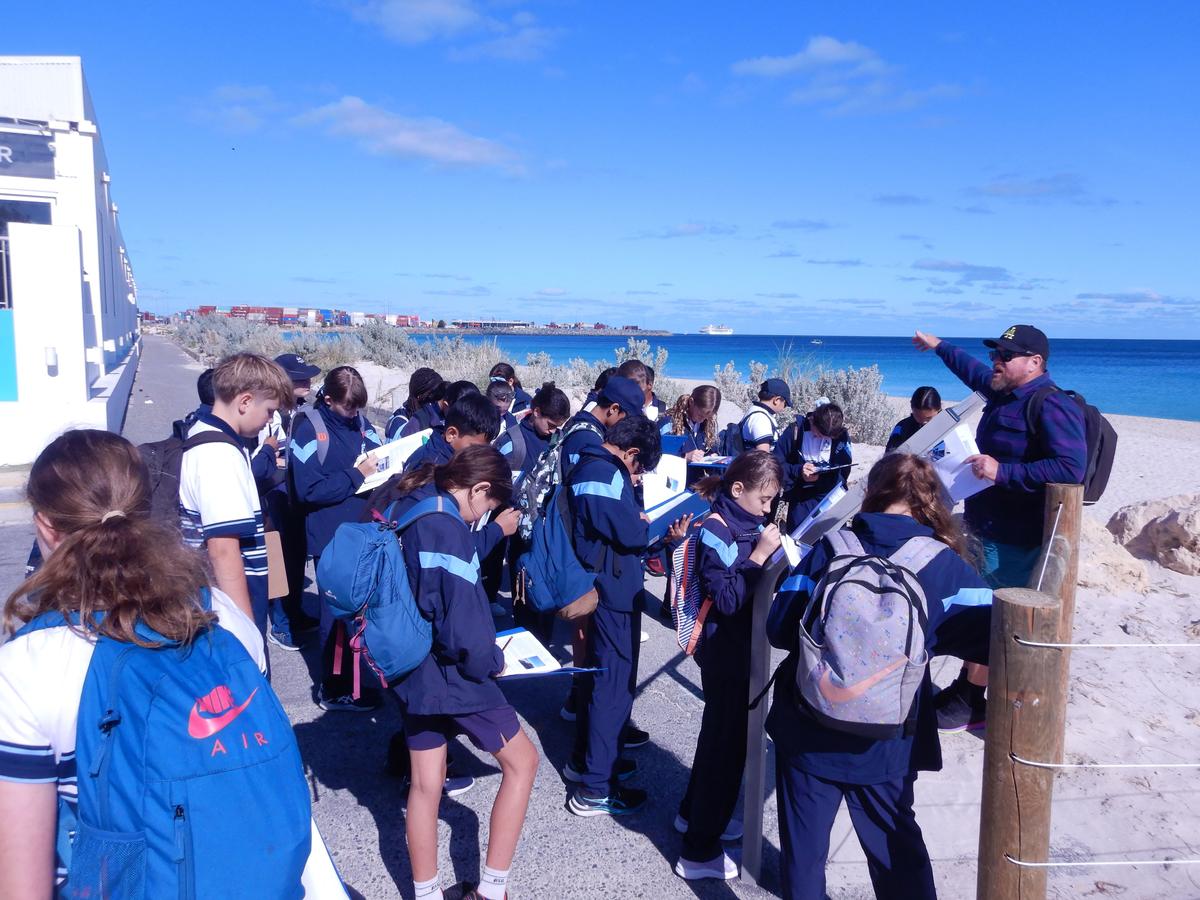Year 8 Curriculum
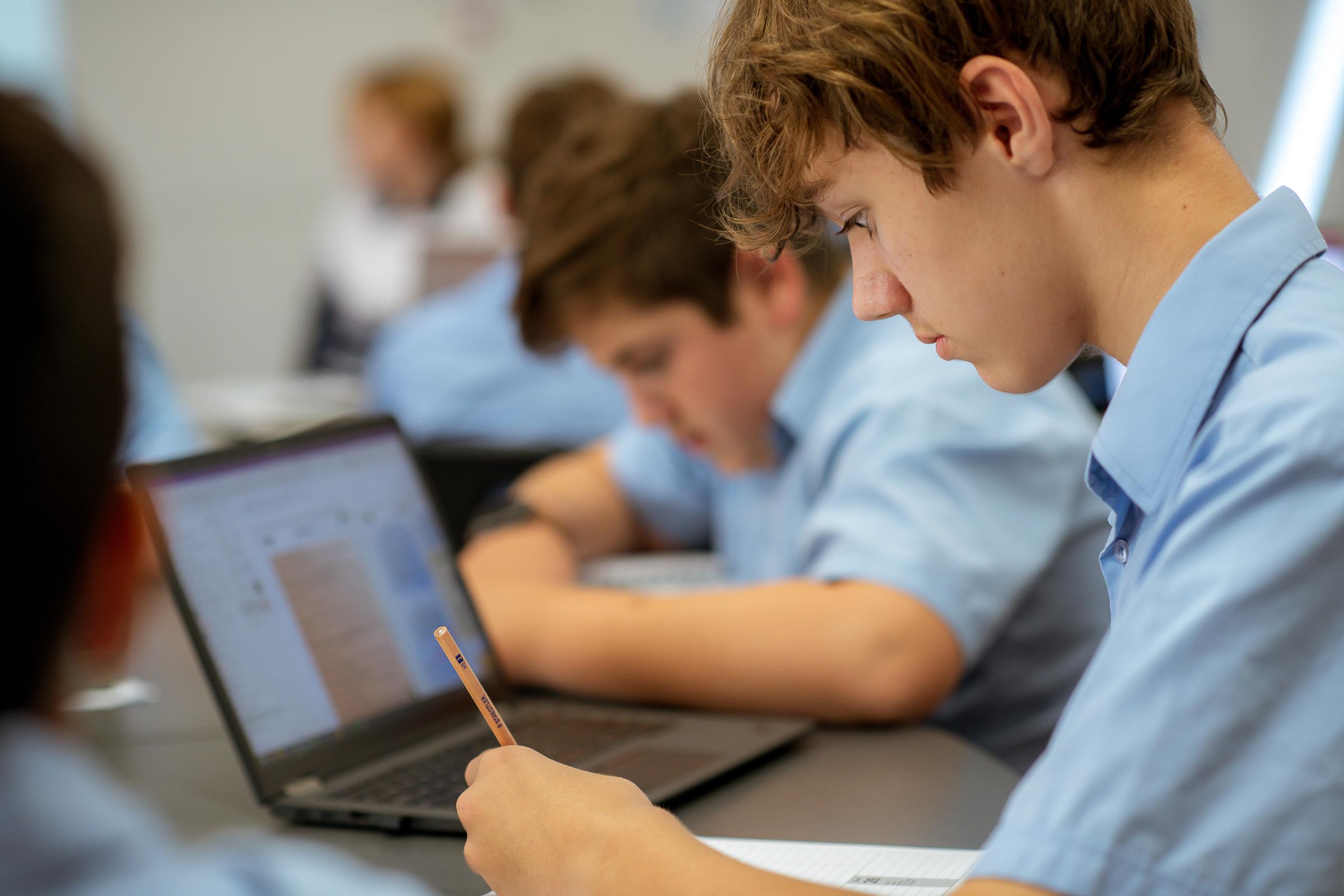
The Learning Program
Students follow a program that exposes them to the different Learning Areas using the Western Australian Curriculum. It provides them with a strong foundation in the knowledge, skills and strategies required in later studies. Our aim is for students to have a wide variety of experiences in Years 7 and 8, which will help them to make informed decisions about pathways they will take in subsequent years. In Years 9 and 10 students can choose from exciting elective possibilities ranging from Photography to The Arts, from Languages to Outdoor Education.
Students are encouraged to develop independence in and responsibility for their learning during Years 7 and 8. The delivery of the curriculum is supported by dynamic practices of peer collaboration, integration and direct teaching. The computer is an important tool in this process.
English
Year 8 English covers the three English strands – Language, Literature and Literacy. The focus is on narrative texts, such as myths, legends, poetry, drama, novels and feature films. Students learn about the conventions used in these text types and they apply this knowledge to create their own written and spoken texts. Wide reading is an important part of their development as English students.
Support for students who experience some difficulty with their literacy skills is provided through a specialist Literacy teacher who is present for some lessons within their English classes. Identified students will also have the opportunity to improve their skills by joining the separate Focus class. This class takes the place of their Language class and runs for two periods a week.
Humanities and Social Sciences (HASS)
There are four key areas in Humanities and Social Sciences (HASS):
- Civics and Citizenship
- Economics and Business
- Geography
- History
Civics and Citizenship focusses on the topic ‘Freedom and Democracy’ and ‘Law and Order’. Areas covered include democratic freedoms, participation in democracy, how laws are made in Parliament, how courts make law, the types of law, and Australia’s identity.
Economics and Business examine ‘Australia’s Mixed Market Economy’ and Work and Financial Decision Making’. Areas covered include how markets operate, how governments are involved in the market, the rights and responsibilities of consumers and businesses, types of businesses, and influences on the way people work.
Geography focuses on the topics ‘Landforms, Landscapes and Hazards’ and ‘Changing Nations’. Areas of study include types of landscapes and landforms in Australia and their value, geographical processes, and the effects and minimisation of geomorphic hazards. In ‘Changing Nations’, the causes and consequences of urbanisation, and reasons for and effects of internal and external migration are studied.
History has a focus on ‘Investigating Medieval Europe’ and the Industrial Revolution’. Medieval Europe focuses on continuity and change in society, the way of life and living conditions, significant developments and people. ‘The Industrial Revolution (1750–1914)’ examines cause and effect, agricultural and technological change, trade wealth, and resources, causing harsh labour for all ages and leading to urban growth, pollution, reforms, and empire expansion.
As part of their course, students are introduced to key concepts which are the high-level ideas that enable students to think from a Humanities and Social Sciences perspective..
- Civics and Citizenship – democracy, democratic values, the Westminster system, justice, participation, rights and responsibilities.
- Economics and Business – scarcity, making choices, specialisation and trade, interdependence, allocation and markets, economic performance and living standards.
- Geography – place, space, environment, interconnection, sustainability, scale, change.
- History – evidence, sources, continuity and change, cause and effect, significance, perspectives, empathy, contestability.
Across all the HASS subjects students practise and develop the skills of questioning and researching, analysing, evaluating, and communicating and reflecting.
Mathematics
Learning mathematics develops essential skills for everyday life and future careers, fostering logical thinking, problem-solving abilities, and a deeper understanding of the world. It also provides a foundation for understanding other subjects and builds critical thinking skills needed for informed decision-making.
Students will develop skills in
- Understanding: Grasping concepts in mathematics.
- Fluency: Doing mathematics quickly and correctly.
- Problem-solving: Using mathematics to solve everyday problems.
- Reasoning: Thinking logically and explaining their answers.
Topics Covered
- Numbers and Calculations
- Ratios and Proportions
- Algebra
- Money and Transactions
- Geometry
- Time
- Probability and Statistics
Real-World Applications: Applying this knowledge and their skills to model situations in real life and investigate solutions.
Year 8 mathematics classes are grouped by ability and prior achievement to best support student learning. High-performing students may be invited to join an accelerated class, where they complete both the Year 8 and Year 9 curriculum within the year. This advanced program is academically challenging and includes participation in several compulsory mathematics competitions.
The remaining students follow the standard Year 8 curriculum. Within this group, Classes 1 to 3 are designed for students ready to engage with more complex mathematical concepts, while Classes 4 to 6 offer progressively more structured support. Class 6, in particular, has a smaller size to allow for more individualised attention.
Science
The Year 8 Science course is structured around the four sub-strands of Science Understanding, delivered as term-long units of study:
- Chemical Sciences – Investigating the atomic model; distinguishing elements, compounds and mixtures at the particle level; atomic symbols and an introduction to chemical formulae; classifying and examining the properties of metals and non-metals; and recognising physical and chemical changes.
- Biological Sciences – Exploring cell structure and function using microscopes; examining systems in flowering plants and vertebrates that perform specialised functions for survival and reproduction.
- Physical Sciences – Understanding kinetic and potential energy; exploring how energy transfers and transformations cause changes within systems; and examining heat transfer, reflection and absorption.
- Earth and Space Sciences – Investigating plate tectonics and global patterns of geological activity; identifying and describing igneous, sedimentary and metamorphic rocks; understanding the rock cycle; and exploring the formation and uses of minerals, ores and other natural resources.
Throughout the year, Science Inquiry Skills—including questioning and predicting; planning and conducting; processing, modelling and analysing data; communicating; and collaborating—are authentically embedded in all learning experiences.
Languages
Every Year 7 and 8 student studies a Language chosen prior to commencement at the College. The College offers two Languages - French: Second Language and Chinese: Second Language. Year 8 students continue with the Language studied in Year 7.
French
The Year 8 course aims to extend students’ cultural awareness and understanding of the language concepts. Through authentic real-life tasks such as making video presentation, conducting interviews or designing advertisements in the target language, students acquire the necessary vocabulary and language structures to demonstrate their knowledge over the four macro-skills of speaking, listening, reading and writing. Comparisons drawn between their own personal world and the lifestyle of French young people allow students to reflect on the links between culture, identity and language and therefore learn to adjust to intercultural communication.
Chinese: Second Language
Year 8 Chinese: Second Language builds on the skills, knowledge and understanding to communicate in the Chinese language developed in Year 7, particularly, focusing on extending their oral and written communication skills. The language is used in more extended and elaborated ways for classroom interactions and routines, task participation and structured discussion.
New Year 8 students will receive notification of their Language allocation when they are given their House and class allocation.
The Arts
Project X is a course that allows students at All Saints’ College to specialise in areas of The Arts whilst also collaborating in a broader Arts context. Project X is a two-year course that offers a strong platform from which our students can grow and develop with an agile mind and keenness to engage in effective, creative Arts practice with confidence in the future.
Rather than offer traditional classes such as Drama, Dance, Media Visual Art and Music, Project X will offer a range of ‘experiences’ that will be far more specific and specialised. Students will also have opportunities to experience art in a real-world context.
The classes also provide a springboard for further cocurricular programs that are accessible throughout the year in Dance, Drama, Media, Visual Art and Music. There are opportunities to publicly demonstrate emerging talents through several performances and concerts.
The College has a very active Music program. Instrumental and vocal tuition at the College can be arranged through the Music Department. There is also a wide range of cocurricular music activities on offer. Further information can be obtained from the Music Office (music@allsaints.wa.edu.au).
Design and Technology
All Year 8 students complete a full semester of Digital Technologies and rotate through a semester of either Food Technology or Product Design. The design process is central to this learning area, supporting the achievement of key learning outcomes.
Through this process, students investigate and research, develop creative ideas, explore a range of solutions, and produce a final outcome. They also reflect on and evaluate both their results and the methods they used. This approach fosters problem-solving skills, critical thinking, and individual expression, ensuring an engaging and meaningful learning experience.
Physical Education
In Year 8 Physical Education students continue to broaden their repertoire of specialised movement skills and knowledge of sophisticated tactical thinking skills, and apply these to an expanding array of physical activity contexts. They build on skills to analyse their own and others' performance and use basic terminology and concepts to describe movement patterns and suggest ways to improve performance outcomes.
Students continue to reflect on, and refine, personal and social skills that support inclusive participation and fair play, and contribute to positive team cohesion.
Alongside Health, the Physical Education program provides opportunities for students to develop, enhance and exhibit attitudes and values that promote a healthy lifestyle. In order to develop strong independent learners and to promote student ownership, students will partake in an options program where they can choose from a variety of activities including Invasion Games, Net Games, Striking and Fielding Games, Aquatics and Fitness. Student will also learn about basic anatomical and biomechanical principles relating to physical performance and partake in a range of athletic activities.
Students will learn through the three distinct areas of movement skills, understanding movement, and interpersonal skills.
Health Education
In Health Education students develop the knowledge, understanding and skills to make decisions and take action to strengthen their sense of personal identity and autonomy, build resilience, manage risk and develop satisfying, respectful relationships. The Year 8 content provides opportunities for students to further examine changes to their identity and ways to manage them. They continue to develop and refine decision-making skills and apply them to a range of situations, as well as in online environments. They investigate health-promotion activities that aim to improve the health and wellbeing of young people and continue to develop critical health literacy skills, including the ability to distinguish between credible and less credible sources of health information.
In Year 8, students will learn in four distinct areas; personal identity and change, staying safe and healthy, interacting with others and active communities and offers students an experiential curriculum that is contemporary, relevant, challenging, and enjoyable. Learning is centred around projects and also includes the development of capabilities.
In Health and Physical Education students identify attitudes and values for a healthy, active lifestyle and demonstrate values consistent with the prevention of ill-health; the acceptance of personal responsibility for their health and physical activity levels; respect for social justice principles; and a commitment to personal achievement. The Western Australian Curriculum: Health and Physical Education provides opportunities for students to develop, enhance and exhibit attitudes and values that promote a healthy lifestyle.
Religion and Philosophy (R&P)
Using Dr Seuss’s Horton Hears a Who! Year 8s explore the possibility of existence beyond our immediate physical world and understanding. They are encouraged to develop ‘ultimate questions’ and discuss mind-stretching concepts of reality and belief.
The concept of religion is explored and Year 8s begin their journey into comparative religions by examining the monotheistic tradition of the Jews, both ancient and modern. Focusing on the Gospel stories, they examine the life of Jesus and his teachings within this Jewish background. This is supported with a series of documentaries from ABC’s Compass which uses Archaeology, History and Science to explore some of the mysteries of this biography.
Some basic history and fundamental beliefs of the Christian Church will then be studied. An excursion to St George’s Cathedral helps the students to reflect on traditional worship, Christian symbolism and the sense of holy spaces. A part of each lesson is devoted to Stillness and Silence, which helps develop skills in relaxation and self-consciousness.
Students are encouraged to question, develop philosophical reasoning, and explore the concept of belief with an open mind.
Life Skills
Taking place for one period per week, Life Skills is dedicated to exploring the social and emotional issues students face, independent of other curriculum expectations. Activities are designed to help students develop skills for life and learning. Early in the year lessons parallel the topics covered in the Peer Support Program which is led by selected Year 11 students. Issues including making friends, seeking help, and trust are explored through a variety of games, activities and discussions.
As the students become more comfortable with one another, the topics will include values and relationships. They are challenged to look at who they are and identify likenesses and differences they share with their peers. The program incorporates Friendly Schools material on bullying and cyberbullying. It also explores Stephen Covey’s 7 Habits, supporting The Leader in Me program, along with other essential Thinking Skills. The aim of this program is to equip students with relevant skills and empathy, so that they are able to develop into more socially and emotionally intelligent members of society.
Innovat[ED]
Innovat[ED] is a unique ASC future-focused program that connects the College and greater community to empower students to develop their voices and capabilities. Through collaborative projects with a ‘real world’ audience, students learn and apply the design thinking process to make a positive difference in the world.
